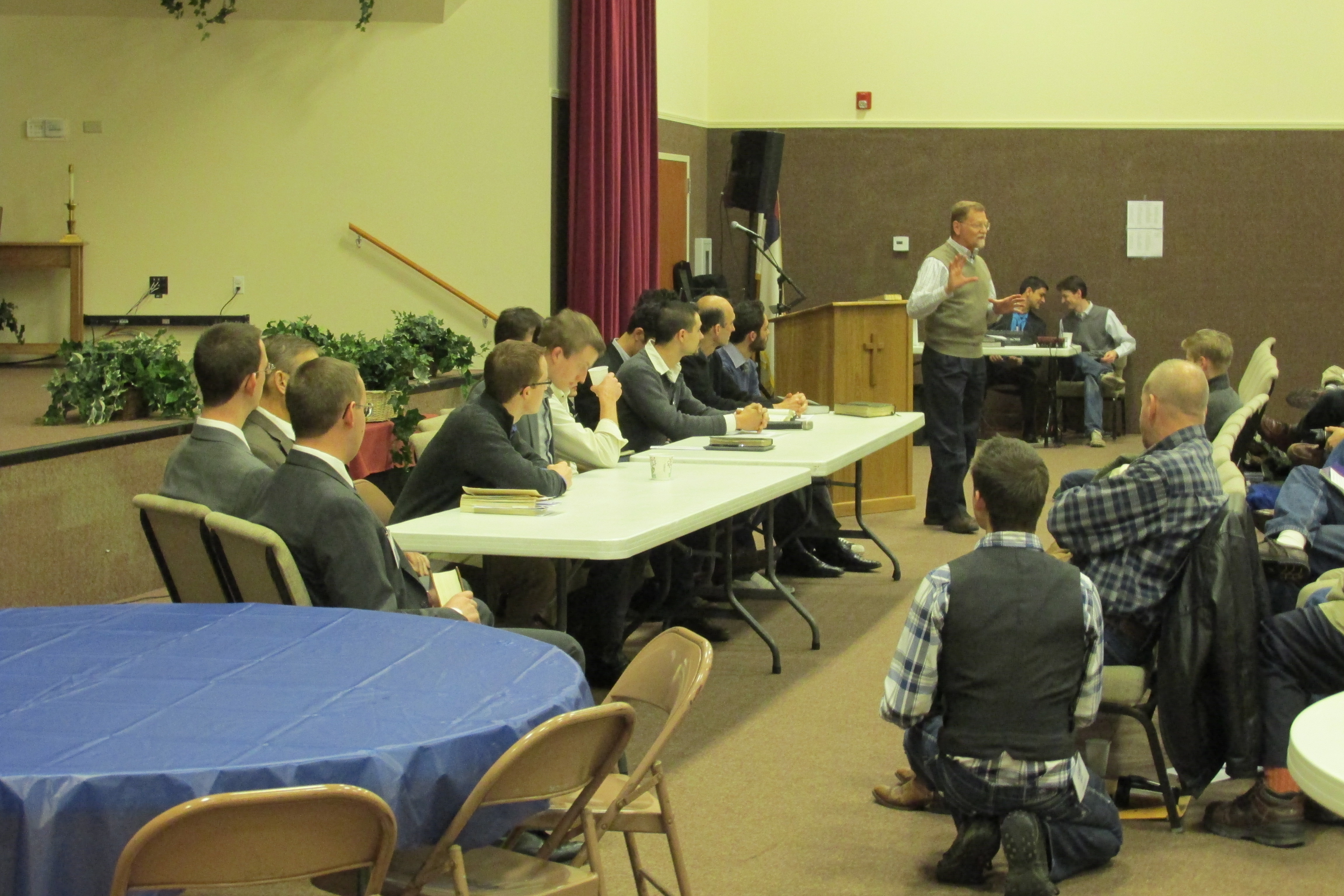A brand new feature about the 2013 Men’s Advance was the inclusion of a special panel, which was made up of several fathers and sons. The desire was that these older and experienced fathers would be able to encourage and pass on some advice to the fathers in the audience, while the sons could also share a word to the young men in attendance.
The panel speakers this year were:
Mr. Nathan Clark George and his son Elliot George
Mr. Gary Huffman and his sons John and Stephen Huffman
Mr. Mark Thomas and his sons Michael, Matthew, Micaiah, and Marscel Thomas
Mr. Randy Winton and his sons Cody and Jesse Winton
Here were some of the questions which the panel was asked and some of their corresponding answers:
1) In order to practice intentional discipleship with your sons, there must be a healthy and close relationship between a father and his son. What are some pieces of advice or recommendations you have for fathers on ways to improve and deepen their relationship with their sons
Randy Winton: Spend as much time as you can with your sons, not just five minutes, but intentional, planned time.
Michael Thomas: I have memories of seeing my father repent of his sins. This made a world of difference in my ability to approach my dad and ask for help and forgiveness when I struggled with sins.
Matthew Thomas: My advice to both fathers and sons is don’t make repentance and forgiveness conditional. If you have an attitude of “I’ll repent and apologize to you, if you apologize to me”, you will be setting yourself up for bitterness in your relationships.
Mark Thomas: If you want to be in authority, you have to be under authority. Father’s must learn how to be a good son under their father, before they can raise and disciple sons of their own. Spend time with your sons, show affection to your children, pray with them. You have to lead in humility. You will disrupt your fellowship with your father or your son if you do not seek forgiveness for sins you committed against them.
Nathan Clark George: Prioritize your time and activities with your son. Refusing to be repentant before your children can lead to a spirit of bitterness and aloofness between parent and child.
Gary Huffman: Take advantage of the opportunities that present themselves. Ask forgiveness from your sons when you respond in anger to their immature behavior. Your example of a father will shape how they view God as perfect Father.
2) How does a father reach out and maintain a healthy and close relationship with his older sons who have moved out of his home?
Mark Thomas: Start early, don’t wait for a particular age to begin forming a deep relationship. If you wait, it will be too late and the moment will be lost. If you start early, your relationship will remain strong, no matter how far apart you may end up. I realized that I wasn’t being as proactive with shepherding their hearts as I should. Even the good fellowship and relationships they were having in their new home couldn’t replace the discipleship that I could provide. So I had to write e-mails, make phone calls, and be proactive about maintaining a close relationship.
Randy Winton: As my sons have grown older and begun to transition out of the house, our relationship has also grown deeper and sweeter. So I want to encourage all the dads here that your relationship with your sons can not continue to be healthy and strong but it can grow to be even more of a blessing. Some of the simple things which I have been practicing in order to maintain my relationship with my sons are saying good morning via text messaging and communicating over every day activities.
Cody Winton: That transition from being a young man to an adult man can be awkward. But, whether or not our father is succeeding at adjusting to this transition, our job as sons is to honor and respect our father. Communication isn’t all the dad’s responsibility. The sons have a responsibility to be proactive in maintaining contact.
John Huffman: It was good for me to see my father honoring my grandfather. This showed me what honor and respect looked like from one adult man to another.
3) As men who are in leadership in local churches, how do you balance discipling the men in your congregation with discipling your sons? How do you communicate to your sons that they are your number one priority?
John Huffman: The experience of being a pastor’s kid has been a good one. Our father always took us with him on his pastoral visits and hospital calls. But there were difficulties. Just as an example, there would be families and friends who would get angry with your father and they would leave the church. You had no control over the situation but you still suffered the consequences of losing a friend.
Jesse Winton: Having my dad as an elder at our church has let me witness good opportunities to be a part in church life and relationships. One of the biggest benefits was that it served as a motivation for me to be pursuing personal holiness. My dad is called to have his household in order. As a member of his household, it is vitally important that I be seeking to live in an orderly and obedient manner so as to not disgrace or disqualify my father.
Nathan Clark George: My dad was not available sometimes because the church needed him. Oftentimes, dad was busy and not present in my life. As I grew older, I was able to find times to spend with my dad. Now, in my family, my wife and kids are under different pressure since I’m the worship leader. So, as a pastor/elder, you must be purposeful in incorporating specific times just for your family and no one else.
Elliot George: Even young sons feel the absence of their father, even when it’s for something as important as church.
Michael Thomas: You have to deal with the pros and cons of knowing what is going on, oftentimes being “in the know” and being prudent with that knowledge. Gossip is easy to fall into. My dad made sure we knew why we were doing what we were doing. This helped when the pastoral crises occurred; we knew why our dad had to respond immediately.
4) Dads, how do you handle the problem of sons talking back or being rude to their mother?
Randy Winton: I built in expectations that you, my son, will honor your mother. If you don’t, there will be consequences.
Gary Huffman: Following the Scriptures, if my sons were disrespectful to my wife, I would discipline them.
Nathan Clark George: I have to be consistent. It is wrong of me to be rude or inconsiderate to my wife while expecting my sons to honor and be considerate to her.
Matthew Thomas: I was more of the verbally aggressive type, like my mom. Many times my dad would take me aside and say, “It’s not about what you say but how you say it.” Respect is more than just the words you use, it is the attitude behind the words that also counts.
Mark Thomas: My wife and I have very different personalities. So I had to learn when my wife was actually getting frustrated and angry. This would help me understand when I needed to step in and address my son’s insensitive attitude.






 Covenant Family Church is a conservative, Bible-believing, and elder-governed congregation located in Wentzville, MO which seeks to evangelize the lost and equip those who have been converted to walk worthy of their calling in Christ.
Covenant Family Church is a conservative, Bible-believing, and elder-governed congregation located in Wentzville, MO which seeks to evangelize the lost and equip those who have been converted to walk worthy of their calling in Christ.  The Orthodox Presbyterian Church continues to be vigorous in its defense and propagation of the historic Christian faith, particularly as it was articulated by the Protestant Reformers of the 16-17th centuries.
The Orthodox Presbyterian Church continues to be vigorous in its defense and propagation of the historic Christian faith, particularly as it was articulated by the Protestant Reformers of the 16-17th centuries.  What led you to visit our website today? What are you seeking? Can we talk about that? Why don't you
What led you to visit our website today? What are you seeking? Can we talk about that? Why don't you  Seek the Lord while He may be found, call upon Him while He is near. Let the wicked forsake his way, and the unrighteous man his thoughts; let him return to the Lord, and He will have mercy on him...
Seek the Lord while He may be found, call upon Him while He is near. Let the wicked forsake his way, and the unrighteous man his thoughts; let him return to the Lord, and He will have mercy on him...